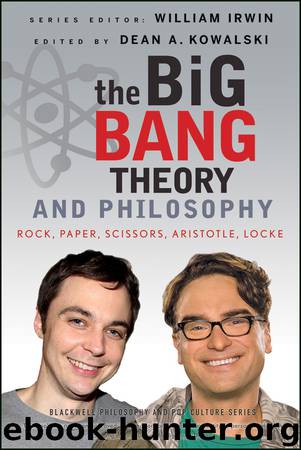The Big Bang Theory and Philosophy by Dean A. Kowalski

Author:Dean A. Kowalski
Language: eng
Format: epub
Publisher: Wiley
Published: 2012-03-16T16:00:00+00:00
The Analysis
So, what exactly is the problem with scientism, and what solutions are available to us? The answers to these two questions are actually among the several comedic premises that make The Big Bang Theory work so well as a show: respectively, the tendency of scientists to overreach, and the push back we can generate by applying some common sense (along with, perhaps, good philosophical reflection). Again, there should be no question that science is by far the best toolbox that humanity has come up with to discover how the world works. Science also needs much defending, as it has been under increasing attack recently, with large portions of Americans denying the theory of evolution, rejecting the notion of anthropogenic climate change, or believing that somehow vaccines cause autism.11 As Carl Sagan aptly put it in his The Demon-Haunted World, a classic collection of essays about pseudoscience and assorted nonsense, science is like a very precious candle in the dark, which deserves our respect and requires our protection.
Yet it should be equally clear that science has a proper domain of application (however large). This implies that there are areas where science doesn’t belong or it is not particularly informative or has nothing to do with what we really want. One of the benefits of The Big Bang Theory is its effectiveness in demonstrating this point, especially through many of the lighthearted exchanges between Penny and Sheldon.
One such exchange is particularly relevant to the debate about scientism. In “The Work Song Nanocluster,” Sheldon volunteers to help Penny make her new “Penny Blossom” business enterprise become as profitable as possible. A bit surprised, Penny asks, “And you know about that stuff?” Sheldon, slightly scoffing, answers, “Penny, I’m a physicist. I have a working knowledge of the entire universe and everything it contains.” Rather annoyed, Penny asks a question to test Sheldon’s hypothesis: “Who’s Radiohead?” This time skipping many beats, Sheldon musters, “I have a working knowledge of the important things in the universe.” This is a near perfect example of the fallacy of scientism: physicists may one day be successful in arriving at a theory of everything, but “everything” has a very specific and limited meaning here, referring to the basic building blocks of the universe. It does not follow, either epistemologically or ontologically, that one can then simply apply the Cartesian method to work one’s way up from superstrings to the cultural significance of Radiohead.12 Moreover, Sheldon is offering a not-so-implicit value judgment here. Yet one could reasonably ask, why is theoretical physics the only important mode of discourse? Or, more to the point, how could Sheldon prove or justify this position within science alone? Value judgments, again following David Hume, seem distinct from scientific discourse exactly because what is or can be done is no sure guide to what ought to be done.
Moreover, it is downright pernicious for science, as well as for society at large, when prominent scientists such as Stephen Hawking declare an entire field of inquiry (philosophy) dead.
Download
This site does not store any files on its server. We only index and link to content provided by other sites. Please contact the content providers to delete copyright contents if any and email us, we'll remove relevant links or contents immediately.
| Direction & Production | Genres |
| Guides & Reviews | History & Criticism |
| Reference | Screenwriting |
| Shows |
Robin by Dave Itzkoff(2426)
Head of Drama by Sydney Newman(2278)
I'm Judging You by Luvvie Ajayi(2187)
The Paranormal 13 (13 free books featuring witches, vampires, werewolves, mermaids, psychics, Loki, time travel and more!) by unknow(2082)
Ten by Gretchen McNeil(1868)
Single State of Mind by Andi Dorfman(1802)
#MurderTrending by Gretchen McNeil(1648)
Key to the Sacred Pattern: The Untold Story of Rennes-le-Chateau by Henry Lincoln(1617)
Merv by Merv Griffin(1607)
Most Talkative by Andy Cohen(1578)
Notes from the Upside Down by Guy Adams(1461)
This Is Just My Face by Gabourey Sidibe(1456)
The Hunger Games: Official Illustrated Movie Companion by Egan Kate(1424)
Springfield Confidential by Mike Reiss(1404)
Binging with Babish by Andrew Rea(1396)
Jamie Oliver by Stafford Hildred(1380)
The TV Writer's Workbook: A Creative Approach To Television Scripts by Ellen Sandler(1338)
Clarkson--Look Who's Back by Gwen Russell(1333)
Blue Planet II by James Honeyborne & Mark Brownlow(1268)
